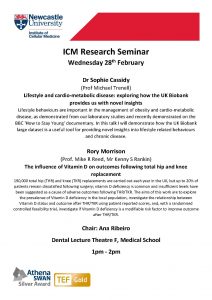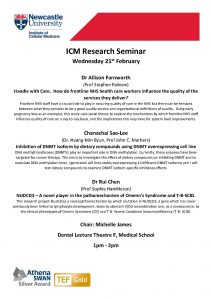Monthly Archives: February 2018
ICM Research Seminar – 28/02/2018
ICM Research Seminar 21st February
HNRC Newsletter, February 2018
Education Endowment Foundation (EEF) & Wellcome Trust – Improving Science Education C/D 9 April, 5pm
9 April 2018, 5pm
Education Endowment Foundation (EEF) & Wellcome Trust
Improving Science Education
https://wellcome.ac.uk/funding/improving-science-education
We are looking for interventions or approaches that are informed and supported by encouraging evidence of impact on attainment and/or progression. Interventions should focus on science attainment and/or progression and we are particularly interested in approaches that are likely to be beneficial for disadvantaged learners.
Interventions should be practical for schools and we expect project teams to include relevant expertise to ensure that approaches are feasible for schools to deliver.
The Wellcome Trust and EEF have undertaken pieces of work that we hope will support applications to this funding scheme and these can be found on the website.
Project criteria
Successful proposals will:
- Focus on raising the science attainment and/or the progression of pupils within the age range 5-16 in UK schools. We are particularly interested in approaches that seek to improve the attainment of disadvantaged learners (pupils eligible for pupil premium funding) and would expect applicants to be willing to work in challenging schools. The progression of students is likely to focus on progression to study a science A-level or other post-16 science qualifications
- Be informed and supported by encouraging evidence of an impact on attainment and progression. If available, evidence of the impact of the approach being proposed should be provided. Please refer to the Sutton Trust and the EEF’s Teaching and Learning Toolkit and the recent review “A review of SES and science learning in formal educational settings”, both available on the EEF website as a starting point.
- Be practical, appropriate, affordable and scalable. Our aim is to identify interventions and approaches that, if shown to be successful, could be taken on by other schools. Therefore we are only interested in testing initiatives that are practical and affordable for schools. We also need to understand what training and support is needed so that schools and teachers can use the intervention effectively.
- Be willing and able to be independently evaluated. We will rigorously evaluate the impact on attainment and, if appropriate, impact on progression of the projects, wherever possible by randomly allocating which schools or pupils receive it. We will appoint an independent evaluator, and work with successful applicants to design an appropriate evaluation plan. Note that this does not need to be included in your project plan and budget.
- Be led by a project team with expertise in the relevant areas. For example, the team should have experience of delivery with teachers, or within schools. Ideally, the team would include someone with extensive teaching experience. We welcome applications from a variety of organisation including, schools, universities, charities and for-profit organisations.
Type of projects
We are interested in projects that either:
- Test the impact of a fully developed intervention through a randomised controlled trial (with the evaluation aspect designed in collaboration with the independent evaluator). For this to be applicable the intervention would need to have been previously been delivered in a number (at least 10) schools and be fully developed in terms of the resources and training required. There would also be clear descriptions of what good fidelity to the intervention looks like and evidence indicating that the programme is likely to impact on attainment. An example of an existing EEF project that met this criteria is Thinking, Doing, Talking Science, which had previously been evaluated in 16 primary schools through a match study. In addition there was background evidence that supported the rational for the programme.
- Test the feasibility and collective evidence of promise of a more developmental project through a pilot evaluation (again, with the evaluation aspect of the project being designed in collaboration with the independent evaluator). For projects to be suitable for this funding they would need to have evidence (from the literature) supporting the rationale for the approach and why we would expect this to lead to the intended outcomes. They would also need to demonstrate the need for the project and that they are not re-developing something that already exists.
How to apply
To submit an application please register for the Improving Science Education Round on the Apply Now section of the EEF website and complete the online form before 9th April 2018.
We are expecting a high level of interest in this round. The Application Form is designed to be short and easy to fill in.
Following the closing date, we will review the applications received against our criteria. We will begin conversations with a small number of the most promising proposals, with a view to jointly developing a project and evaluation plan with the independent evaluator that will be appointed by the EEF.
We do not expect to make final funding decisions until the end of June 2018.
INE journal club – Thursday 22nd February
Our next INE journal club will be on Thursday 22nd February between 1pm-2pm. Journal club will be held in the large meeting room M1.025, located on the 1st floor corridor that links the Cookson and Leech Buildings. Lunch will be provided.
Rob Usher will be presenting the paper:
The atypical chemokine receptor 2 limits renal inflammation and fibrosis in murine progressive immune complex glomerulonephritis
INE seminar list
INE 2017-18
All talks are currently planned to take place at 4pm (3.30pm for Tea and Coffee with biscuits) in the Research Beehive, room 2.22 (except 17th May which is in the Baddiley Clark seminar room and 15th March in DLTE).
Thursday February 15th 2018
Dr Wafa Khamri, Imperial College London
Lymphocyte dysfunction in liver failure
Wednesday March 15th 2018 (joint ICM and INE seminar) 2pm Dental Lecture Theatre E
Dr Sandrine Henri, Centre d’Immunologie Marseille-Luminy (CIML)
Disentangling the myeloid cell complexity in the skin to unravel cutaneous specific immune function
Thursday March 15th 2018
Dr Joanne Konkel, University of Manchester
Title to follow; “Immune cell networks at barrier sites, effects of tissue microenvironment on immune function”
Thursday 12th April 2018
Dr. Dean Naisbitt, University of Liverpool
Title to follow;. “chemistry of antigen formation and the mechanisms behind an aberrant T-cell-mediated immune response”
Thursday May 17th 2018
Baddiley Clark seminar room
Prof. Ben Wilcox, Professor of Molecular Immunology, Institute of Immunology and Immunotherapy, University of Birmingham
Title to follow; “Novel tumour antigens and unconventional T cell function”
June 2018 AGM Meeting –Durham (14th June, details to be confirmed)
ESRC New Investigator Grants – Next Internal Panel
The next internal panel to consider applications to be submitted to the ESRC New Investigator Grant scheme will meet in April 2018.
New Investigator Grants form one element of ESRC’s support for early career researchers and the scheme is specifically aimed at supporting those looking to make the transition to an independent researcher through managing their first major research project. These grants replace their Future Research Leaders scheme. Full details are here: http://www.esrc.ac.uk/funding/funding-opportunities/new-investigator-grants/.
The call is open to high-quality candidates from anywhere in the world who have a maximum of four years’ postdoctoral experience and the support of an eligible UK research organisation. Grants ranging from £100,000 to £300,000 full Economic Cost (fEC) can be awarded, with grants between 3 and 5 years.
The call is open to applicants both with and without a permanent academic post, but they must have strong support from a host UK institution. This includes a mentor, and provision of career development support which includes a programme of activities tailored to the needs of the applicant covering project management, methods development, KE activities and impact training, and international networking.
Proposals are welcomed across the full disciplinary range of the social sciences and at the interface with the wider sciences, however the social sciences must represent at least 50 per cent of the research focus and effort.
Following the previously agreed protocol (see the attached paper), all applications to be submitted to this scheme will go through an internal selection panel. Candidates are required to submit a 6 page case for support (following ESRC guidance), a 2 page CV and a 2 page mentor CV. Applications must have full support of the Research Director and Head of School to be put forward to the internal panel. There will be representatives from all 3 Faculties on the panel, which will be chaired by the Dean of Research and Innovation in HaSS.
All documents for the panel should be submitted to Wendy Davison (wendy.davison@ncl.ac.uk). The deadline for submission of documents for the internal panel is 12pm on Monday 16th April 2018. Applications submitted after this deadline will be required to submit to the following panel.
Below is the current most up to date guidance, any questions please contact Gwen Averley or Darren Airey.
International Women’s Day FMS event – Wednesday 7th March 2018
Wednesday 7th March from 2.15pm to 4pm in the David Shaw Lecture Theatre (with tea and biscuits beforehand in the David Shaw Foyer).
On the 8th March there is another International Women’s Day event organised by the University which has Marcia Willis Stewart QC (Hons) speaking as part of the overall celebratory events. Please see more details and registration form for this event on:-
http://www.ncl.ac.uk/about/athena-swan/events/eventitems/eventiwd2018.html
The events are of particular significance this year as they mark the 100th anniversary of the Representation of the People Act 1918, which allowed some women over the age of 30 to vote for the first time. So definitely something to celebrate!!
Event on the Commercialisation of Medical Products
15 February 2018 at 6pm
Partner’s Room, Newcastle University Business School.
The Chartered Institute of Marketing is running an event with Newcastle University Business School on the “The commercialisation of medical products”
The event is free to CIM members and students, and all others pay £15. Book here https://www.cim.co.uk/event/88449/
More information below.


